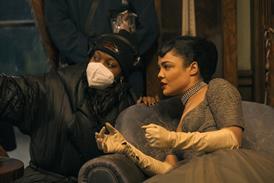Dir:Gholamreza Ramezani. Iran. 2004. 78mins.
Want to make a heartwarming Iranian kids' movie' Take an endearing kid froma poor background, give her a goal, and then provide an obstacle. It worked forThe White Balloon (goal: buy goldfish; obstacle: money goes down thedrain, literally), and it works for Hayat, which opened the Kinderfestat Berlin and held most of its young audience rapt for 78 minutes, despite thelack of Potteresque special effects and subplots.
It'sdifficult to see this film doing quite as well as The White Balloon,which remains the biggest-grossing Iranian film in the States - if only becauseHayat treads such similar ground. And the shortish running time could bea problem. But it would be a surprise if this small charmer were not picked upfor arthouse distribution in territories like France and Italy, which havealways been particularly open to Iranian cinema.
Hayat is as formulaic, in itsown way, as a classic Hollywood rom-com, but the formula is developed withgrace, and lifted by standout performances from the two child leads. Above all,though, it is the caressing, painterly colour photography of Saed Nikzat whichgives this small and fragile film a leg-up towards international distribution.Nikzat, who also made the difference to A Time For Drunken Horses, couldwell become the Chris Doyle of the Middle East.
Hayat(Parsafar), a girl in her early teens, lives in a rural village in northernIran. A bright student, she is due to take an exam at the village school whichwill determine whether or not she qualifies for further education.
Onthe morning of the exam, Hayat's father falls seriously ill, and her mother isforced to leave Hayat at home with her younger brother and the baby while shetakes him to hospital in the next town.
Findinga babysitter should be a fairly easy task in a village where everyone knowseveryone and most of them are related. But fate and the script has it that onthis particular day everyone is away, busy or deeply unimpressed by Hayat'sdilemma: as the mother of a friend who has dropped out of school tells her,"all you need to learn are embroidery, cooking, sewing and how to make teaproperly; school is for the men".
Ifthis sounds rather crudely didactic, it is: like The Circle or SecretBallot, Hayat fits into that strain of recent Iranian cinema thatserves up motivational messages in narrative sauce. But it's a worthy message,and Hayat delivers it with such good-humour and grace that it would bechurlish to resist.
Theprotagonist's quest is veined by good humour - some of it in the form of simplerepetitive gags (Hayat trying and failing to milk a cow, Hayat's super-cuteyounger brother asking his primary school teacher for permission to go to thetoilet), some of it embodied by the village characters the girl encounters -like the old woman who guzzles the baby's milk, or the old men in the squarewho sit around smoking and grumbling about the young people of today.
Thereare times when the tension drops, and times when the obstacles thrown in Hayat'spath are too contrived to take seriously (like a key in the well'). But thejourney is so ravishingly shot, and the end so efficient at delivering thefeelgood factor, that most audiences will forgive the longueurs.
Prodco: AshtianifilmProds
Int'l sales: P&S Film
Prod: MohammedBaqer Ashtiani
Scr: MojtabaKhoshkdaman
Cine SaedNikzat
Prod des: Gholamreza Ramazani
Ed: SaedShahsavari
Mus: HamidReza Sadri
Main cast: Ghazaleh Parsafar, Mehrdad Hassani, Mohammad Saeed Babakhanlo

















No comments yet